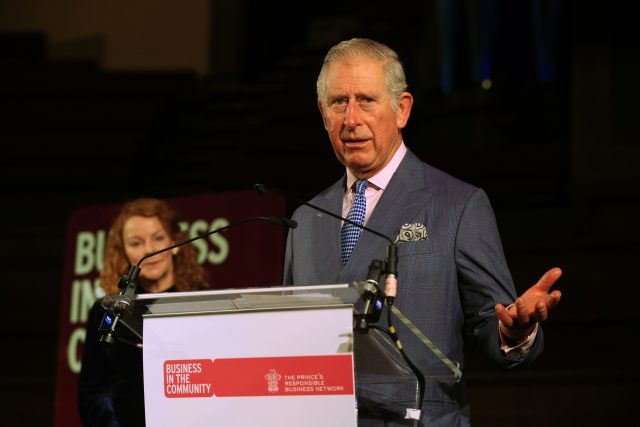The Prince of Wales lobbied for a change to two climate change deals after investing in a offshore carbon credit trading company, according to the leaked Paradise Papers.
The Duchy of Cornwall paid 113,500 dollars (£58,000) in 2007 for 50 shares in the Bermuda-registered Sustainable Forestry Management Ltd (SFM) in 2007.
Following the purchase, Charles lobbied for a change to two climate change deals that would have directly benefited the business, the BBC and the Guardian reported.
#ParadisePapers – 13.4 million documents, 94 media partners, more than 120 politicians and world leaders. https://t.co/lHHyt9eLTS pic.twitter.com/mecTosLSxD
— ICIJ (@ICIJorg) November 5, 2017
On Tuesday, a spokesman for Clarence House denied that Charles had spoken out on the two deals in order to benefit financially.
“The Prince has never chosen to speak out on a topic simply because of a company that The Duchy may have invested in,” he said.
“In the case of climate change his views are well-known, indeed he has been warning of the threat of global warming to our environment for over 30 years.”
The spokesman added that carbon markets were just one of many strategies Charles had championed to try and slow the pace of climate change.
SFM, which counted one of Charles’s closest friends as a director, traded in credits from tropical and subtropical forests, but these type of credits were largely excluded from the EU’s Emissions Trading Scheme (EU ETS) and the Kyoto Protocol.
Duchy of Cornwall’s offshore investments. #paradisepapers #princecharles pic.twitter.com/hN8MsJPMVu
— Darran Marshall (@DarranMarshall) November 7, 2017
Four months after the share purchase, details of the company’s efforts to lobby for amendments to the two treaties were sent to the Prince, minutes from a board meeting suggested.
The documents were apparently sent to Charles at the request of millionaire banker and conservationist Hugh van Cutsem, whom the Prince had met during his time at Cambridge.
Charles criticised the EU ETS and the Kyoto Protocol in speeches he gave shortly after receiving the papers, the reports said.
Notes from a board meeting held in Paris and published by the BBC read: “The chairman referred the committee to the bundle of materials which had been prepared by the company for various policy makers… Mr van Cutsem… asked that a set of documents be prepared for the Prince of Wales’ office. The chairman undertook to do so.”
A month later, Charles made a speech criticising the two agreements for their failure to include credits from rainforests.

Speaking at the Business in the Community Awards dinner, he said: “As the Kyoto protocol now stands tropical rainforest nations have no way of earning credits from their standing forests other than by cutting them down and planting new ones.
“The European Carbon Trading Scheme excludes carbon credits for forests from developing nations. This has got be wrong and we must urge the international community to work together to redress these failings urgently.”
In October 2007, he launched the Prince’s Rainforest Project, with the aim of “increasing global recognition of the contribution of tropical deforestation to climate change and to find ways to make the rainforests worth more alive than dead”.
He again criticised the two agreements in a speech to mark the launch.
Neither the EU ETS or the Kyoto Protocol were changed as a result of the Prince’s lobbying, the BBC said, adding it had been unable to find public criticisms of the two accords made by the Prince before 2008
The Duchy of Cornwall sold its shares in SFM in 2008 for 325,000 dollars (£246,000), according to the leaked papers, almost tripling its investment.
The papers also showed the Duchy of Cornwall made offshore investments totalling £3.9 million in four funds in the Cayman Islands in 2007, the BBC said.
This is legal and there is no suggestion the Prince received any tax benefit as a result of the investments in either SFM or the four funds based in the Cayman Islands.
A spokesman for the Duchy of Cornwall said: “The Prince of Wales does not have any direct involvement in the investment decisions taken by the Duchy.
“These are the responsibility of The Duchy itself. The Duchy of Cornwall’s accounts are independently audited and presented to Parliament every year. The Prince voluntarily pays income tax on any revenue from The Duchy.”






